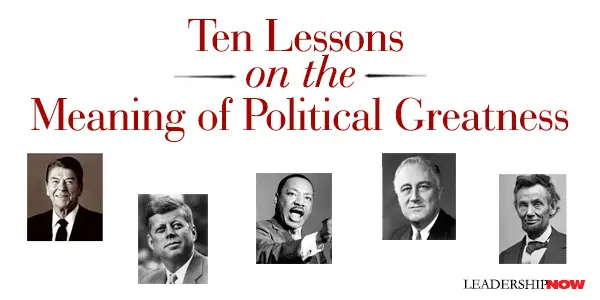Ten Lessons on the Meaning of Political Greatness

WALTER NEWELL plumbs the depths of history in The Soul of a Leader, “in order to illuminate the recent past, the present, and the challenges to come. Taken together, while they not add up to a recipe for the perfect leader, they at least show how moral, psychological, and intellectual resources we inherit from the traditions of the West, its experiences and its reflections on statecraft from ancient times onward, can give us a compass for the challenges America’s next generations of leaders will inevitably face.”
- Character trumps brains—or at least formal education. “Neither Winston Churchill nor Abraham Lincoln received a formal university education, and their names live on among the greatest leaders of any age.”
- Inspiring rhetoric is necessary—but only in moderation. Leaders must realize “that words are not all-powerful against reality. The ability of leaders like Jefferson, Lincoln, and Martin Luther King Jr. to inspire with words was matched by years of hard slogging, and the occasional compromise, to win over opponents or the undecided.”
- Moral conviction is necessary—but only in moderation. “Sometimes choosing the lesser evil ends up doing the most good….On the other hand, no rule is infallible, and sometimes a stance of uncompromising moral conviction does earn the greatest admiration.”
- A leader embodies the times. “When a leader finds his moment, we feel we already know him. He is like us, he faces what we face.”
- A leader must have two or three main goals, and not try to do too much. For successful leaders “their main aims had years, even decades, to incubate. By the time they gained high office, they had the luxury of changing tactics as needed, because the strategic goal was firmly fixed.”
- Time will run out. Leadership is temporary.
- History will choose its leaders. “History itself will create an energy and identify itself with the right leader.” The moment when a leader “seems to walk with history….You must learn to anticipate that wave, be ready to ride it without being dumped by it.”
- The great leader wants power badly—but not too badly. “One may have to be content with having done one’s duty.”
- Greatness can turn out to be villainy. “Charisma can conceal a dark side.”
- The great leader must be prepared to ignore all of the above. “When in doubt, the great leader must be bold and stick to his guns—must lead, not follow.” It may mean reversing yourself. “People admire honest effort even if it turns out to be flawed.” Does this always work? No. People “take comfort from a leader who cares enough to try something big.”
* * *

Like us on
Instagram and
Facebook for additional leadership and personal development ideas.
* * *

Posted by Michael McKinney at 03:25 PM
Permalink
| Comments (0)
| This post is about Government
, Leaders










